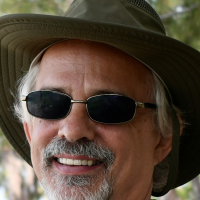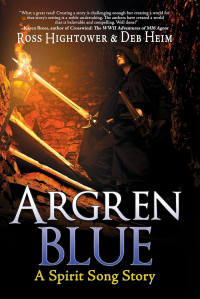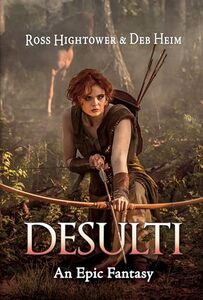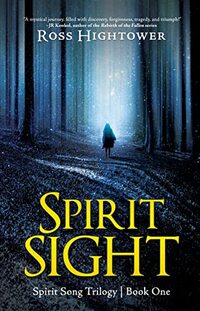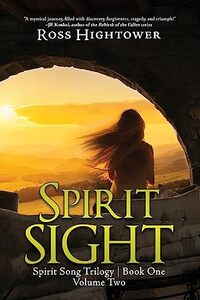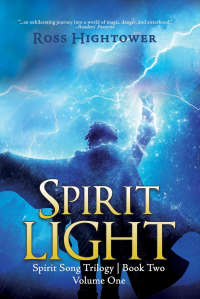Ross Hightower Interview Published on: 30, Jan 2023
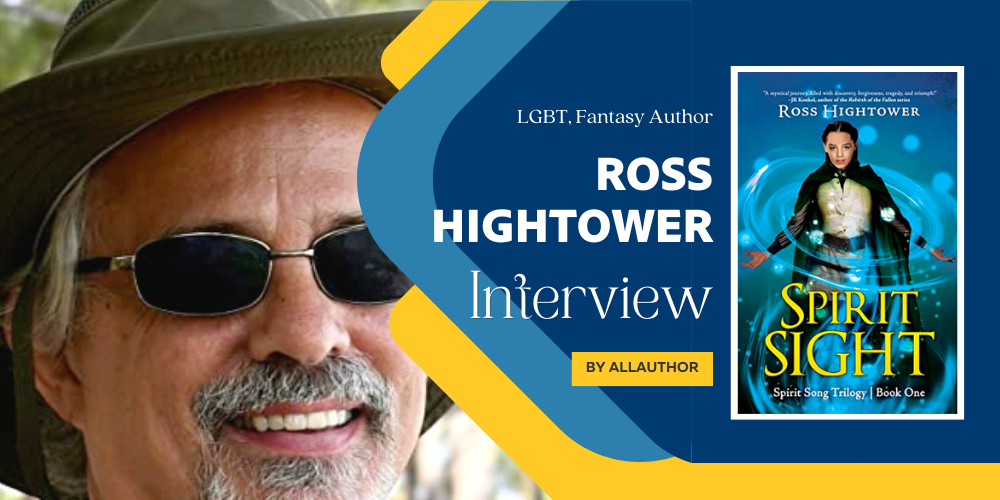 Tell us a little bit about your childhood and background. What kind of child would you say you were?
Tell us a little bit about your childhood and background. What kind of child would you say you were?
I grew up in the south, the son of a preacher. For a variety of reasons, I never lived more than three years in one place until I went to college. A quiet kid, who was often in trouble for reading a book in class instead of paying attention, I was usually only just making friends before we were off again. I don’t have any regrets about the way I was raised. I had great parents and, though we were never rich, we didn’t want either. Though I think that nomadic lifestyle left its imprint on my ability to make and keep friendships, I also learned to sit back and observe. I think that shows through in my writing.
How did you begin writing your first book?Ever since I was very young, I’ve told myself stories at night when I should be sleeping. My mother always found it vexing when she had to herd her exhausted son through the morning routine to get me off to school. When I was a little older, I tried to write these stories down, but I could never get the words to match what I saw in my mind, so I assumed I didn’t have whatever arcane talents that make an author.
Though I’m an adult now, I’m still telling myself stories. About four years ago, I lay in bed one night considering how fantasy authors come up with new and interesting magic systems. For a reason I’ll never be able to explain, the next morning I woke up, went to a coffee shop and started writing. I had an initial premise—that a young person’s magical gifts caused pain in other people—and I had a couple of characters. I started with a single line of dialog—“You’re leaking”—and I just unleashed my imagination. It was thrilling. Three hours later I knew I was going to keep writing. The words still didn’t cooperate, but I’m older and wiser and was more willing to push through to wrangle the story into shape. That story ended up being a critical scene in my first novel, Spirit Sight.
How did your friends and family react to your first book?Thrilled and amazed. I’ve been overwhelmed by their positive reactions.
Your thoughts on conventional vs. self-publishing? What route did you choose and why?I decided to give the conventional route a try, but I didn’t have a really strong feeling about it. There are pros and cons either way. Several publishers told me they liked the story but wanted me to split it into multiple books. I couldn’t figure out how to do that and preserve the story, so I was on the verge of giving up. I actually paid an artist to create a cover and formatted the manuscript in preparation for self-publishing. But then I got the email from Black Rose Writing that changed my life. I still think there are merits to both routes to publishing, but there was something about having a publisher decide to take a chance on my story. It was a vivid moment in my life.
When you first sat down to write a story stuck in your head, did you expect to turn it into a novel?No, I had no idea where it was going. It took me a long time before I considered the possibility of it becoming a novel. The only thing I knew was that I really loved the story, the characters, and that writing gave me a deep sense of satisfaction.
What doubts did you have while writing your first book?Is it good enough? The writing especially, but also the story. Like many authors, I’m never completely happy with my writing. Even now, I would love an opportunity to do just one more draft on Spirit Sight.
What challenges did you face while getting your first novel, Spirit Sight?Learning to write. As I mentioned above, my prose was initially pretty stodgy. But one thing being an academic has taught me is how to learn, so I went into research mode. One of the more important things I read early on was in Stephen King’s book, On Writing. He said writing was a craft, that, though you may not become one of the greats, you can become a good writer through hard work. I took it to heart and dug in.
I can’t tell you how many drafts I did on Spirit Sight, because it wasn’t that organized. There were scenes I wrote early on that I labored over repeatedly. The hard work is paying off. At some point, the words started to cooperate a bit more, and in Argren Blue, my second novel, there are the occasional passages I’m really proud of.
What made you decide to write a prequel called Argren Blue?Spirit Sight is a story of people oppressed by an authoritarian empire. While I was writing it, I wondered how these peaceful people started fighting back. Argren Blue is that story. It turned out that Argren Blue dovetails nicely with Spirit Sight, providing background and depth to a complex story. My partner, Deb, and I enjoyed working on it together so much, we’ve decided to continue that story with two additional books. Each of these will parallel and inform the main Spirit Song trilogy. But Argren Blue is more than just backstory. It is a fun story that we think readers will really enjoy.
How different would your life have been if you didn’t find your calling in life?My day job would be less stressful. On a serious note, I’ve never done anything on an intellectual or creative level as satisfying as writing. It’s an adventure I never imagined I would take, and writing with Deb has brought our relationship to another level.
What is your ultimate aim in life?At the end of the day, I want to look back at the long course of my life and say, “That was a life well lived.”
Who designs your book covers? Do you think that a book cover plays an important role in sales?I think the book cover plays a huge role. There are so many books now that it is very difficult to attract attention. You usually have a moment to catch a potential reader’s eye to entice them to read the description, blurbs, reviews, etc. So far, I’ve used my publisher’s artist, but we’re looking for an artist that can help us realize our vision for our covers.
When writing a book, how do you know when too much is too much? Or how do you know when you have to shorten a particular scene?I know what the scene is supposed to accomplish in the plot. Once I’ve accomplished that, I go back and add thematic elements and the emotional beats that add depth to characters and relationships. I usually have a sense of when it’s done.
Some might say I got the length of Spirit Sight wrong. It’s long. But that’s not what reviewers say. They say, though it’s intimidating at first, that you don’t notice the length when you start reading because the story pulls you along. In terms of plot complexity, it’s closer to a Game of Thrones than a Harry Potter. There are multiple plot lines, many characters, action, twists, revelations. Every subplot and character must have the proper level of attention before everything can come together in a satisfying conclusion.
What is more important: a scene or a character description?I assume you mean the descriptions of the environs for a scene and the physical description of the characters. If that’s the case, then scene descriptions are more important. I don’t spend a lot of time on characters’ physical descriptions so the reader can form their own images. Putting Minna on the cover of Spirit Sight is my one regret about that book.
But the description of the environs of a scene is vital to allowing the reader to “see” the scene. In Argren Blue, when Alar stands on the precipice and sees that a “…patchwork of nature’s summer palette cloaked the nearby mountains. The sun dipped toward the horizon, leaving the sky a deep blue, dotted here and there by puffy, white clouds. A cool breeze lifted his sweat-soaked hair and raised goose bumps on the back of his neck.” You understand why he loves his mountainous home.
Which is the next book you are working on? Is it another fantasy?I’m working on the sequel to Spirit Sight, tentatively called Spirit Light and Deb and are planning the sequel to Argren Blue, which will be called Desulti.
Lastly, how do you promote your work on social media? Has AllAuthor been helpful in this regard and would you recommend it to other authors?I was unprepared for the marketing required of an author, and I still have a lot to learn. There isn’t enough time to pay attention to the details the way you really need to. I’ve found the scheduled tweets at AllAuthor helpful, and I love the mockup banners. Like so much of the marketing experience, AllAuthor has a lot more to offer. I just need to get my head around it all.
Share Ross Hightower's interview
Ross Hightower grew up in the south, the son of a preacher. He retired from education in July of 2020 after serving youth and families as a teacher. His debut novel, Spirit Sight is a story of people oppressed by an authoritarian empire. He is living in Milwaukee with his wife of 34 years.
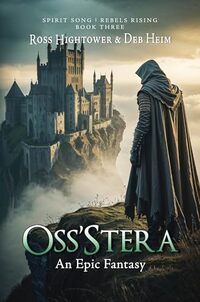 Oss'stera: An Epic Fantasy (Spirit Song: Rebels Rising Book 3)
Genre: LGBT, Fantasy, Teen & Young Adult
Oss'stera: An Epic Fantasy (Spirit Song: Rebels Rising Book 3)
Genre: LGBT, Fantasy, Teen & Young Adult
